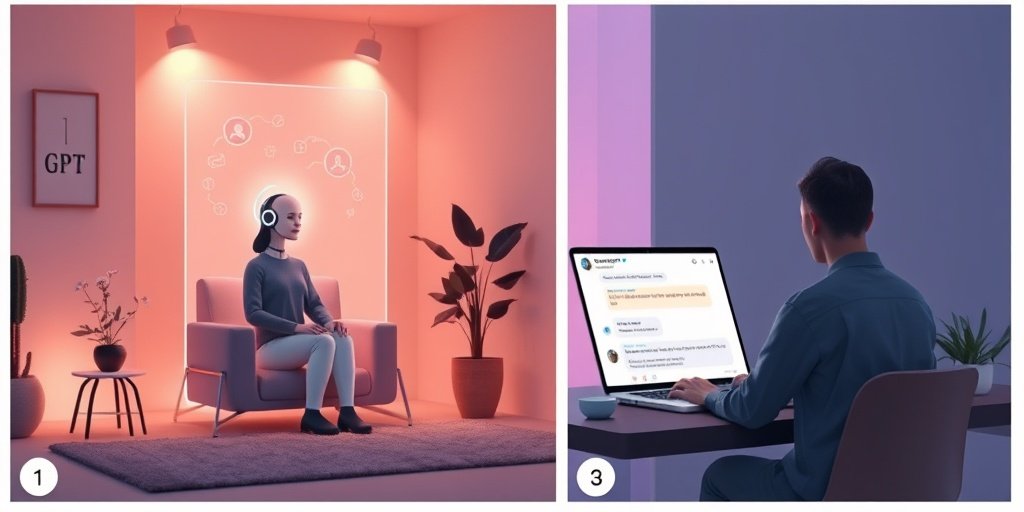⚡ Quick Summary
This study explored the use of ChatGPT as a digital therapist through a thematic analysis of social media discourse, revealing that users engage with generative artificial intelligence (genAI) for various mental health needs. The findings highlight both the therapeutic potential and the risks associated with using AI in mental health contexts.
🔍 Key Details
- 📅 Study Period: January 2024
- 🔍 Platform: Reddit
- 🧠 Focus: ChatGPT and therapy
- 📊 Methodology: Thematic analysis of user posts
🔑 Key Takeaways
- 🧠 Users sought ChatGPT for managing mental health issues and self-discovery.
- 🤝 Engagement patterns included simulating therapy sessions and externalizing thoughts.
- 🌟 Users appreciated ChatGPT’s therapist-like qualities, such as emotional support and understanding.
- 🔒 Privacy concerns were noted but were infrequent among users.
- 📈 Users perceived ChatGPT as objective and effective, highlighting its potential in mental health.
- ⚖️ Ethical considerations regarding AI in therapy were emphasized, calling for increased awareness.
- 💡 The study suggests a need for AI literacy among the general public.

📚 Background
The rise of generative artificial intelligence has opened new avenues for addressing mental health needs, particularly in the absence of regulatory frameworks. As individuals increasingly turn to AI tools like ChatGPT for therapeutic support, understanding their experiences and perceptions becomes crucial for both ethical and practical considerations in mental health care.
🗒️ Study
This study employed a digital ethnographic approach to analyze Reddit posts from January 2024 that mentioned “ChatGPT” and “therapy.” By examining user interactions and intentions, the researchers aimed to uncover the multifaceted roles that genAI plays in mental health support.
📈 Results
The analysis revealed that users engaged with ChatGPT for various reasons, including managing mental health problems, seeking companionship, and enhancing mental health literacy. Users appreciated the tool’s perceived therapist-like qualities, such as emotional support and constructive feedback, while also valuing its machine-like benefits, including constant availability and lack of negative reactions.
🌍 Impact and Implications
The findings of this study underscore the potential of genAI in creating digital therapeutic spaces for mental health. However, they also highlight the need for careful consideration of the ethical implications and the importance of fostering AI literacy among users. As AI continues to evolve, understanding its role in mental health care will be essential for maximizing benefits while minimizing risks.
🔮 Conclusion
This study illustrates the complex relationship users have with generative AI like ChatGPT in the context of mental health. While the tool offers promising therapeutic potential, it also raises important ethical questions that must be addressed. Ongoing research and dialogue are necessary to navigate the evolving landscape of AI in mental health care.
💬 Your comments
What are your thoughts on using AI like ChatGPT for mental health support? We would love to hear your insights! 💬 Join the conversation in the comments below or connect with us on social media:
“Shaping ChatGPT into my Digital Therapist”: A thematic analysis of social media discourse on using generative artificial intelligence for mental health.
Abstract
OBJECTIVE: Generative artificial intelligence (genAI) has become popular for the general public to address mental health needs despite the lack of regulatory oversight. Our study used a digital ethnographic approach to understand the perspectives of individuals who engaged with a genAI tool, ChatGPT, for psychotherapeutic purposes.
METHODS: We systematically collected and analyzed all Reddit posts from January 2024 containing the keywords “ChatGPT” and “therapy” in English. Using thematic analysis, we examined users’ therapeutic intentions, patterns of engagement, and perceptions of both the appealing and unappealing aspects of using ChatGPT for mental health needs.
RESULTS: Our findings showed that users utilized ChatGPT to manage mental health problems, seek self-discovery, obtain companionship, and gain mental health literacy. Engagement patterns included using ChatGPT to simulate a therapist, coaching its responses, seeking guidance, re-enacting distressing events, externalizing thoughts, assisting real-life therapy, and disclosing personal secrets. Users found ChatGPT appealing due to perceived therapist-like qualities (e.g. emotional support, accurate understanding, and constructive feedback) and machine-like benefits (e.g. constant availability, expansive cognitive capacity, lack of negative reactions, and perceived objectivity). Concerns regarding privacy, emotional depth, and long-term growth were raised but rather infrequently.
CONCLUSION: Our findings highlighted how users exercised agency to co-create digital therapeutic spaces with genAI for mental health needs. Users developed varied internal representations of genAI, suggesting the tendency to cultivate mental relationships during the self-help process. The positive, and sometimes idealized, perceptions of genAI as objective, empathic, effective, and free from negativity pointed to both its therapeutic potential and risks that call for AI literacy and increased ethical awareness among the general public. We conclude with several research, clinical, ethical, and policy recommendations.
Author: [‘Luo X’, ‘Ghosh S’, ‘Tilley JL’, ‘Besada P’, ‘Wang J’, ‘Xiang Y’]
Journal: Digit Health
Citation: Luo X, et al. “Shaping ChatGPT into my Digital Therapist”: A thematic analysis of social media discourse on using generative artificial intelligence for mental health. “Shaping ChatGPT into my Digital Therapist”: A thematic analysis of social media discourse on using generative artificial intelligence for mental health. 2025; 11:20552076251351088. doi: 10.1177/20552076251351088